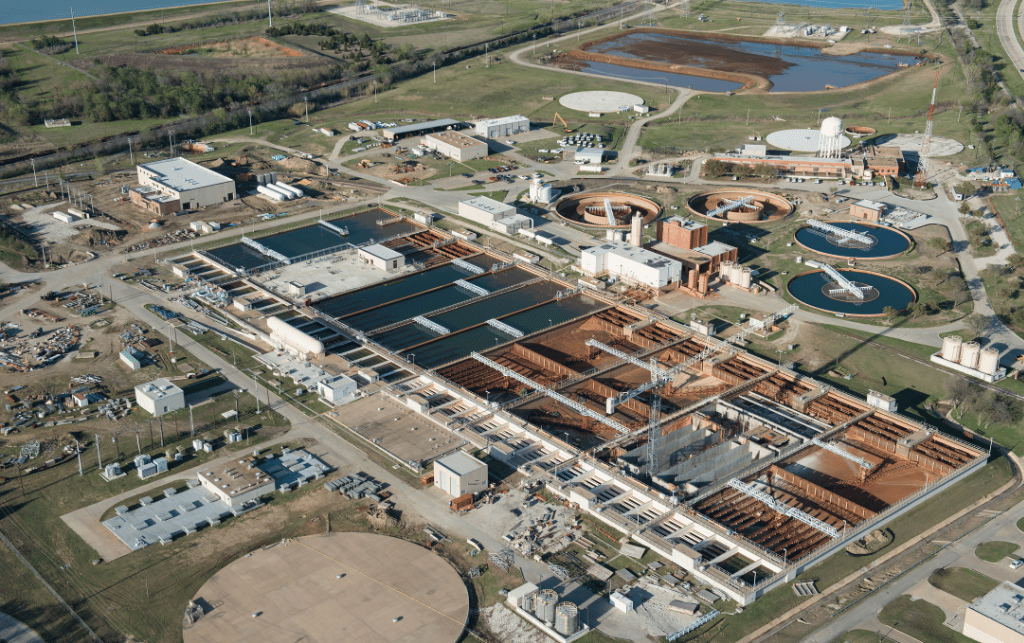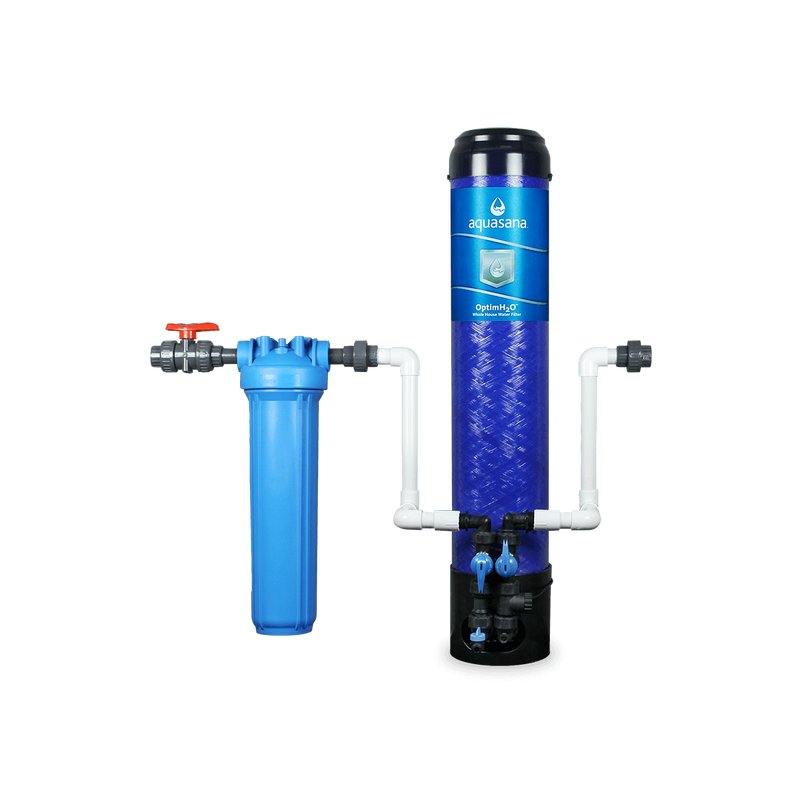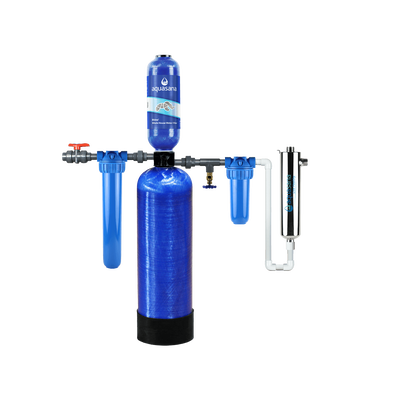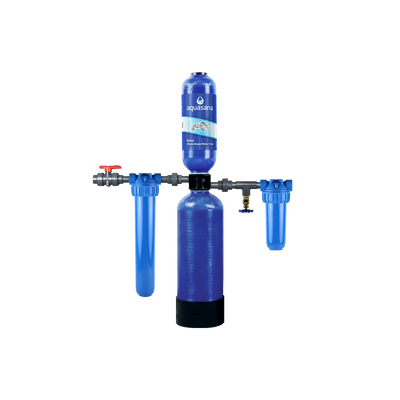When showering or boiling water, contaminants like chlorine may vaporize which can make them even more dangerous because they’re more easily absorbed by your lungs. Pre-emptively filtering these contaminants prevents vaporization and improves the quality of air in your home so you and loved ones can breathe easier.
5. Make your newly washed clothes softer, help them retain color, and last longer
Using chlorine-contaminated water contributes to color fading when you wash your clothes, so bright colors will appear dark and dim over time. Additionally, mineral deposits from hard water can make clothes appear dingy or sullied and even leave holes. In addition to reducing chlorine, some whole house systems come bundled with a softener or conditioner, which removes hard water minerals like calcium and magnesium to prevent color fading, stiffness, and damage to your clothes.
6. Get cleaner dishes with less effort
Hard water often leaves streaks or stains on dishes after washing, due to mineral deposits sticking and soap lathering issues similar to what happens when showering. Even after relentless scrubbing, you may find it difficult or impossible to get a spotless rinse because the water you’re using keeps dirtying the dishes. Installing a whole house system with a softener or conditioner removes the hard water minerals that leave deposits and streaks, so you can get cleaner dishes with less effort.
7. Increase the lifetime of household appliances by removing coarse minerals
Contaminants like sediment or hard water minerals cause your appliances to work harder, making them less efficient and reducing their lifespan. Whole house systems remove contaminants that increase the wear and tear on appliances like your washing machine, dishwasher, and anything else that uses water. The result is that your appliances will work more efficiently and last longer so you can enjoy their benefits as intended. You may even find that the cost savings of a longer lifespan for these appliances cover the expense of a whole house system in the long-run.
8. Better than bottled water
Some people may turn to bottled water to address concerns about the tap water in their home, but there’s a long list of reasons why a whole house filter is a better choice. To start, bottled water won’t protect you from contamination when using water for cooking, washing clothes, cleaning dishes, or bathing. Additionally, bottled water can be expensive to rely on, as drinking the recommended 8 glasses per day would cost $1,400 from bottled water compared to only $0.49 from the tap. Not to mention, disposable plastic bottles are terrible for the environment. Each day, people in the U.S. throw away more than 60 million plastic bottles, and only 23% of plastic bottles are recycled.
If that’s not good enough to get you to pivot away from plastic bottles, maybe the fact that plastic water bottles are less regulated than tap will. Plastic water bottle brands are not required to disclose where their water comes from, how it’s treated, or what contaminants it contains. Compared to bottled water, a whole house water filter provides greater protection, is more cost-effective, and is better for the environment.
9. Added layer of protection
If you get water from the city, a whole house water filter provides an extra layer of protection in case something goes wrong with the water supply. In some cases, the treatment facility may issue a warning that outgoing water is contaminated in real-time so you can know to avoid it. However, there are other cases where a contamination issue may go unnoticed or ignored for days or months.
The notorious Flint Water Crisis began when the city switched the water supply to the Flint River in April 2014, but residents were repeatedly told the water was safe and a state of emergency was not declared until December 2015. Even after discovering concentrations of lead more than 25 times the level deemed actionable by the EPA in March 2015 — complaints and alarming findings were dismissed again and again.
A whole house water filter provides an additional layer of protection and peace of mind, even if you think your water is safe as is. It’s especially important if you rely on water from a private well, which is not tested or treated by any group unless requested by the homeowner.
Problems that whole house water filters address
The drinking water in your home can contain many naturally-occurring impurities, like iron, magnesium, and calcium. However, city-treated water can also contain chlorine or chloramines — disinfecting compounds used before your water enters your home. Filtering city water can improve its quality, but filtering well water is more of a necessity because it isn’t tested or treated by the government. Here are the different problems whole house systems address regarding city and well water:
Common city water problems
Chemical Contamination - Public water is treated by the government, usually with a cocktail of chemicals and filtration methods. Not only can contaminants slip past these precautions, but the chemicals most commonly used by municipalities – chlorine and chloramines – are contaminants in and of themselves. Additionally, other contaminants may be picked up on the way to your home as the water travels through lines that may contain lead or other impurities. Whole house systems remove these contaminants added during the treatment process or during transportation to your home.

Well water problems
Unknown Contaminants - Because the EPA doesn’t place regulations on well water, testing and removing contaminants is the responsibility of the homeowner. A poorly constructed well could become contaminated by sewage systems or other sources such as waste runoff. Before using well water, the homeowner should have it thoroughly tested and may need to install a filter. There are several whole house systems designed specifically for wells, which target the contaminants associated with this water source.
Hard Water - Well water is more likely to be hard because its coming from the ground instead of reservoirs, and the water may absorb minerals from the soil surrounding it. Whole house systems can come bundled with a softener or conditioner to address this issue.
Options for whole-house water filters and their benefits
Whole house systems typically utilize several stages of filtration to remove different types of contaminants, and there are usually several optional add-ons to enhance performance. Each stage of filtration targets specific impurities, and homeowners may be able to customize a whole house system to address their top water contaminant concerns. Aquasana Rhino® whole house water filters come standard with a four-phase filtration process equipped with the following filtration types:
- Sediment Pre-Filters: are the first line of defense for a whole home filtration system. They stop rust, sediment, and silt that can clog your filter and pipes, sparing you costly repairs later on.
- Copper-Zinc: clear out heavy metals and chlorine. Shower steam can have chlorine levels up to 20 times higher than tap water. Inhaling shower steam with chlorine can cause lung irritation and shortness of breath.
- Activated Carbon Filters: remove chlorine.
- Post-Filters: reduce any remaining sediment and organic particles.
The filters above effectively target contaminants associated with city water; however, if your water comes from a non-regulated source like a private well, you may need extra layers of defense. Filtration options available as upgrades to stock whole house systems include:
- UV Filters: can sterilize harmful viruses, bacteria, and cysts. If your water comes from a well, installing a UV filter and changing it once a year is highly advisable.
- Water Softeners: tackle hardness-causing minerals like calcium and magnesium to deliver soft, scale-free, and spotless water throughout your home. If your home has hard water, these systems provide many cost-saving benefits.
- Salt-Free Water Conditioners: reduce scale buildup in pipes, plumping, and hard water appliances. Unlike water softeners, conditioners don’t require salt or electricity. These systems are best suited for water with a hardness level below 15 grains per gallon.
- Low Maintenance Pre-Filter: an upgraded version of the standard Pre-Filter that lasts 3X as long so you go farther between replacements.
Overall, the particles and contaminants in our water influence our health on multiple levels – thankfully, whole house water filters have plenty of options for tackling these issues. A single whole house system may be more cost-effective than installing and maintaining a combination of under sink, countertop, or shower filters throughout the home.
WHOLE HOUSE
OptimH2O®
Tested and certified to reduce lead, cysts, and PFOA/PFOS, plus tackles chlorine and chloramines.

Get cleaner water with Aquasana
At Aquasana, we’ve spent hours researching and identifying which contaminants and disinfectants give your water an undesirable taste and smell, and have designed filters that reduce them. All of our whole house systems are independently tested to NSF/ANSI Standards to reduce contaminants, and our Rhino® systems are Water Quality Association certified to NSF (National Sanitation Foundation) Standard 61. Shop systems or contact us to learn more.



